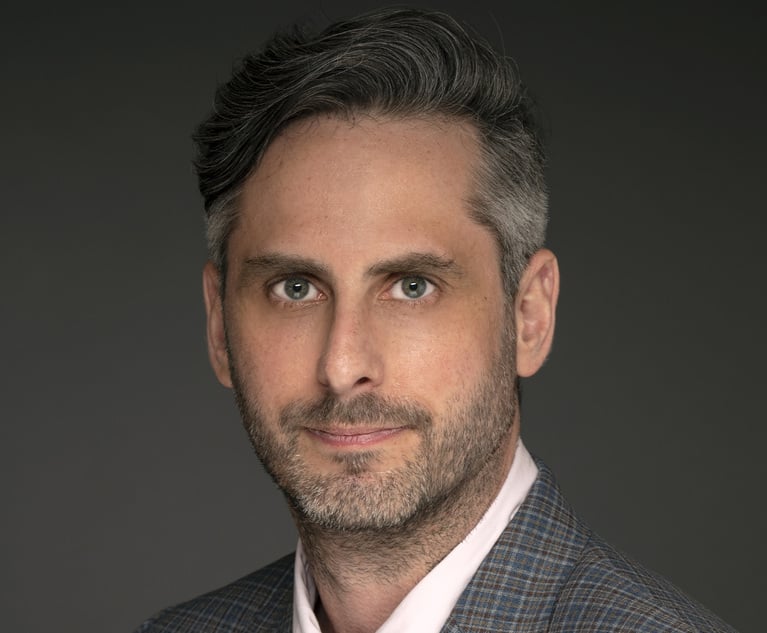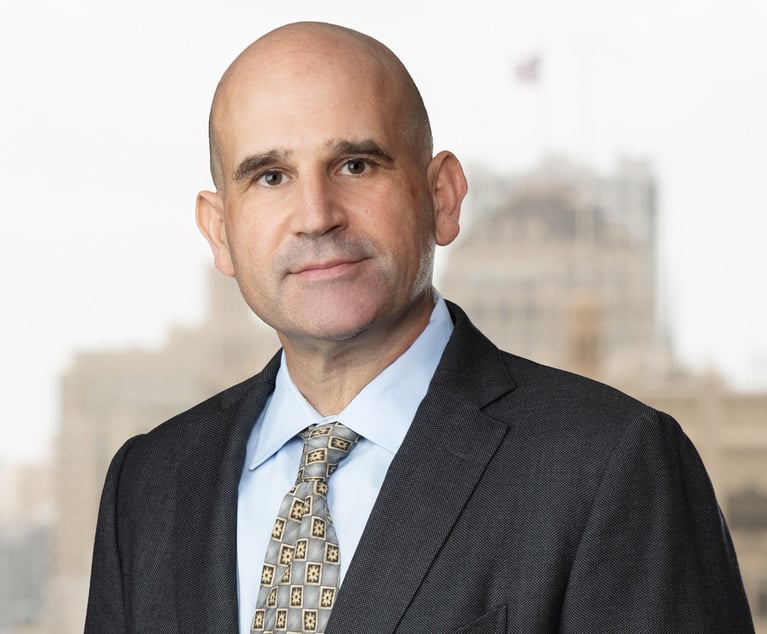Litigation Department of the Year, Runner-Up: Jones Day
Jones Day landed a runner-up honors in The Recorder's 2017 Litigation Department of the Year after hooking the largest patent verdict in U.S. history.
November 14, 2017 at 01:45 PM
5 minute read

Jones Day landed a runner-up honors in The Recorder's 2017 Litigation Department of the Year after hooking the largest patent verdict in U.S. history.
The firm won a $2.54 billion patent trial verdict for Idenix Pharmaceuticals against Gilead Sciences at trial in December 2016. During the judging period, firm litigators also won a seven-fold increase in distribution to its clients in the Caesars Entertainment bankruptcy, and two IP trials for Synopsys Inc. against rival ATopTech. Christopher Lovrien, the partner-in-charge of Jones Day's California region, recently explained the firm's focus on being trial-ready.
What do each of these matters the firm is being recognized for demonstrate about Jones Day's litigation capacities? The results we achieved in these cases demonstrate that we have great trial talent in our litigation practices and that we frequently exercise our trial “muscles.” Jones Day regularly tries more cases in more courts than other large firms, and we have one of the most active appellate and Supreme Court practices.
One reason we are able to recruit such talented trial lawyers (and future trial lawyers) is that there is an apparent and established path to significant trial experience at Jones Day, and that path begins early. We provide stand-up experience to our new lawyers early in their careers, and they have significant responsibility in litigation from handling witnesses to leading or co-leading trial work throughout their careers, which is just one reason our bench is always so deep.
But most importantly, these examples demonstrate our ability to deploy the right lawyers for each matter without regard to parochial criteria—like which lawyers, practices or offices get “credit” for the work—that has nothing to do with client service or getting results.
Take for example our Idenix team which won the largest patent verdict in U.S. history. That trial team included lawyers drawn from our business and tort litigation, intellectual property, and issues and appeals practices and who were resident in our Atlanta, Chicago, Cleveland, San Diego and Washington, D.C., offices. The only criteria assessed in formulating the team was who gives our client the best chance for victory.
I know Jones Day is a big, diverse firm, but you also tout yourselves as one firm, worldwide. Is there any one trait you think is consistent across all the firm's litigators? If so, what is it? Each of our litigators has his or her own style and brings the perspective of his or her unique background, but all of us have been trained to develop a simple, durable narrative of the case from the outset.
All of us also understand that success requires a deep understanding of our clients' business, products and culture; proactive and tight integration with in-house counsel; a strategic approach to every step of the case; and an ability to see the case empathetically through the fact-finders' eyes. Most importantly, the common trait among our litigators, like all Jones Day lawyers, is that we share professional values that are focused on serving clients and collaborating seamlessly across all offices and practices in doing so.
It's a challenging litigation market, with flat or declining demand and rate pressures. From a business perspective, what does it take for a litigation department to succeed in this environment—especially one that focuses on taking on clients biggest and most challenging matters? Our firm takes a long-term view on the business side of law and on our client relationships. We know that long-term success requires meeting and exceeding client goals and expectations time-and-again, and we do not sacrifice the strength of those long-term relationships for short-term financial gain.
We know clients expect us to be smart, aggressive, creative and efficient. Having long-term, and deep, client relationships also helps us to deliver service more efficiently because we come to deeply understand our clients' business, their strategic objectives, their executives, and their culture. And because we are a true partnership with formidable talent in practices and jurisdictions worldwide and not a Swiss verein or some other joint-venture arrangement, we provide seamless service to our clients wherever they do business.
Fewer cases are going to trial, and those that are tend to be high stakes. In light of these facts, what is the firm doing to get new lawyers stand-up opportunities in front of judges and juries? First, because so many of our client relationships are broad, long-term relationships, we find that our clients are as interested as we are in seeing litigators develop stand-up experience at early stages of their careers. Thus, when appropriate opportunities arise, most of our clients happily consent to having newer lawyers argue motions or take witnesses at trial.
Second, we have an active pro bono practice which affords most of our associates significant stand-up opportunities during their first few years of practice. Third, we supplement these experiences with training that includes learning-by-doing. As a global legal services institution that is focused on the long run, we put a priority on getting succeeding generations the experience they need today to be the leaders of tomorrow.
How are your litigators harnessing technology to work more efficiently? We partner with our clients to increase the amount, and speed, of collaboration through tools like virtual case rooms, Sharepoint sites and case mapping. We use predictive coding and technology-aided document review to help control discovery costs. And we use transcript review software which allows for quick searching and access of deposition transcripts in the midst of trial.
These tools are, of course, in addition to more generalized technology like messaging and videoconferencing, which is available to all of our lawyers on their firm laptops.
This content has been archived. It is available through our partners, LexisNexis® and Bloomberg Law.
To view this content, please continue to their sites.
Not a Lexis Subscriber?
Subscribe Now
Not a Bloomberg Law Subscriber?
Subscribe Now
NOT FOR REPRINT
© 2024 ALM Global, LLC, All Rights Reserved. Request academic re-use from www.copyright.com. All other uses, submit a request to [email protected]. For more information visit Asset & Logo Licensing.
You Might Like
View All
How the Deal Got Done: Sidley Austin and NWSL Angel City Football Club/Iger

How Uncertainty in College Athletics Compensation Could Drive Lawsuits in 2025

How I Made Practice Group Chair: 'Think About Why You Want the Role, Because It Is Not an Easy Job,' Says Aaron Rubin of Morrison Foerster

Outgoing USPTO Director Kathi Vidal: ‘We All Want the Country to Be in a Better Place’
19 minute readTrending Stories
- 1Call for Nominations: Elite Trial Lawyers 2025
- 2Senate Judiciary Dems Release Report on Supreme Court Ethics
- 3Senate Confirms Last 2 of Biden's California Judicial Nominees
- 4Morrison & Foerster Doles Out Year-End and Special Bonuses, Raises Base Compensation for Associates
- 5Tom Girardi to Surrender to Federal Authorities on Jan. 7
Who Got The Work
Michael G. Bongiorno, Andrew Scott Dulberg and Elizabeth E. Driscoll from Wilmer Cutler Pickering Hale and Dorr have stepped in to represent Symbotic Inc., an A.I.-enabled technology platform that focuses on increasing supply chain efficiency, and other defendants in a pending shareholder derivative lawsuit. The case, filed Oct. 2 in Massachusetts District Court by the Brown Law Firm on behalf of Stephen Austen, accuses certain officers and directors of misleading investors in regard to Symbotic's potential for margin growth by failing to disclose that the company was not equipped to timely deploy its systems or manage expenses through project delays. The case, assigned to U.S. District Judge Nathaniel M. Gorton, is 1:24-cv-12522, Austen v. Cohen et al.
Who Got The Work
Edmund Polubinski and Marie Killmond of Davis Polk & Wardwell have entered appearances for data platform software development company MongoDB and other defendants in a pending shareholder derivative lawsuit. The action, filed Oct. 7 in New York Southern District Court by the Brown Law Firm, accuses the company's directors and/or officers of falsely expressing confidence in the company’s restructuring of its sales incentive plan and downplaying the severity of decreases in its upfront commitments. The case is 1:24-cv-07594, Roy v. Ittycheria et al.
Who Got The Work
Amy O. Bruchs and Kurt F. Ellison of Michael Best & Friedrich have entered appearances for Epic Systems Corp. in a pending employment discrimination lawsuit. The suit was filed Sept. 7 in Wisconsin Western District Court by Levine Eisberner LLC and Siri & Glimstad on behalf of a project manager who claims that he was wrongfully terminated after applying for a religious exemption to the defendant's COVID-19 vaccine mandate. The case, assigned to U.S. Magistrate Judge Anita Marie Boor, is 3:24-cv-00630, Secker, Nathan v. Epic Systems Corporation.
Who Got The Work
David X. Sullivan, Thomas J. Finn and Gregory A. Hall from McCarter & English have entered appearances for Sunrun Installation Services in a pending civil rights lawsuit. The complaint was filed Sept. 4 in Connecticut District Court by attorney Robert M. Berke on behalf of former employee George Edward Steins, who was arrested and charged with employing an unregistered home improvement salesperson. The complaint alleges that had Sunrun informed the Connecticut Department of Consumer Protection that the plaintiff's employment had ended in 2017 and that he no longer held Sunrun's home improvement contractor license, he would not have been hit with charges, which were dismissed in May 2024. The case, assigned to U.S. District Judge Jeffrey A. Meyer, is 3:24-cv-01423, Steins v. Sunrun, Inc. et al.
Who Got The Work
Greenberg Traurig shareholder Joshua L. Raskin has entered an appearance for boohoo.com UK Ltd. in a pending patent infringement lawsuit. The suit, filed Sept. 3 in Texas Eastern District Court by Rozier Hardt McDonough on behalf of Alto Dynamics, asserts five patents related to an online shopping platform. The case, assigned to U.S. District Judge Rodney Gilstrap, is 2:24-cv-00719, Alto Dynamics, LLC v. boohoo.com UK Limited.
Featured Firms
Law Offices of Gary Martin Hays & Associates, P.C.
(470) 294-1674
Law Offices of Mark E. Salomone
(857) 444-6468
Smith & Hassler
(713) 739-1250






